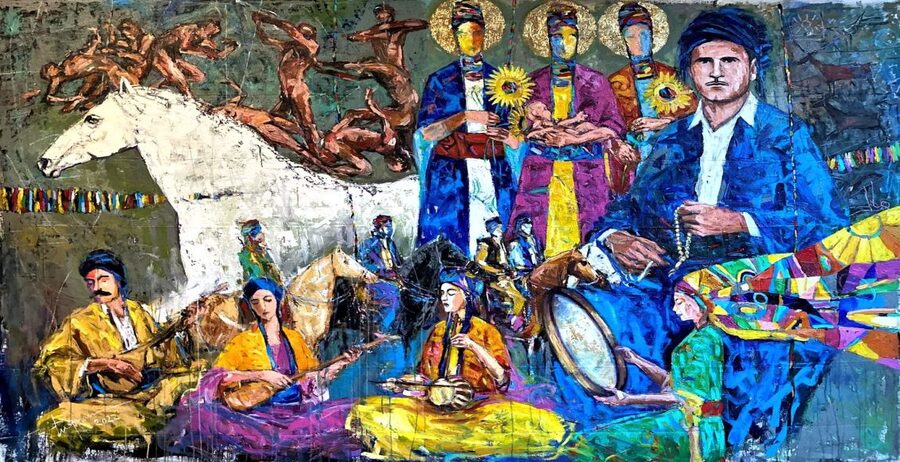Human pains and sorrows cannot be expressed by colors and words; however, a voice can make people feel those pains. Perhaps, people cannot express their own sorrows, but they can cry it out. Sometimes this cry turns into music and sometimes, it means singing; it turns into a beautiful voice or an enjoyable Maqam to be sung by many or in a lot of countries.
In this article, we will introduce the sorrowful, tired, painful, and beautiful voices so that you can know these various kinds of voices.
When "Mehmet Uzun" defines singing, he says: "The singers are those who make their voice alive, they let their voice become a living thing."
Singing is a very important tradition. Kurds have always been forced to keep their culture via "voice" or "narrations" and transfer it from one generation to the other because they did not use to write and author books commonly. The narrations, poems, songs, and stories have been transferred to the new generation via the art of the singers who have kept them from getting lost.
One can say that singing is the root of Kurdish culture. If we take a look at the history, we can see that most of the singers were not occupied in any other occupation so that they could keep the Kurdish culture alive.
The long living Kurdish singers have transferred Kurdish culture to this day through their passionate songs. At the same time, the singers have narrated the unwritten history and the oral literature of the Kurdish language to the Kurdish society. The Kurdish nation has clarified its history and culture through the songs or the singers' lyrics. These songs have been listened to like a story.
Singing is a part of the Kurdish nation's culture and oral literature and it is connected to the people's lives. Neither funerals nor weddings can go without words…, words have been Kurdish people's friend in times of loneliness.
Singing is the soul of humanity and culture. If society has been able to preserve their culture, art, and history and know them it is definitely because of singing.
Singing culture is an endless treasure. Singing does not know any boundaries or borders and its richness is borderless.
Singing plays a great role in Kurdish culture. The oral literature of Kurdish like songs, stories, poems, biographies, anecdotes, myths, etc. is very rich and their texts are naturally very sophisticated.
Singing has an independent way in Kurds' lives since they can listen to music when they are happy, sad, or in love.
It is not important whether you look at which aspect of Kurdish people's lives because there are tens or hundreds of songs that have been sung about them. Songs have been sung about wars and battles, goodness and sincerity, betrayal and sadness, kindness and love, compassion and sympathy, migration and diaspora, poorness and loneliness, sadness and dark times, happiness and excitement. About the nature of Kurdistan, there are various songs, too. Via these songs, our history and our nation's way of life have been documented to be kept from being forgotten.
The place where the singer presents their art is called Diwan. In Kurdish, Diwan means the room of the great people. The Diwan was in Mirs, Kings, and Agha's and the elderlies of the villages' homes at first.
Hundreds of Kurdish singers and artists have appeared in our ancestral land. we still get awakened by their voice even nowadays. We can mention these names among the great Kurdish singers: "Avdal, Zanik, Shakro, Karabet Chakho, Baqi Khido, Maryam Khan, Ayshashan, Golbahar, Tahsin Taha, Mohammad Aref Jaziri, Hussein Far and Murad Kan" and many more. Each of these voices created priceless treasures and impacted the written literature greatly. Based on the social events and the relationship between folklore and society, they have left their fingerprints on history and have become honorable people who will live among people forever.
Every singer sings their Maqams with their own voice and their stories are different from one area to the other. Some of them were shepherds and began singing when they were occupied in that job. Every singer has presented their songs in their own dialect. Since they have done so, the Kurdish language will stay alive forever and will be an independent language. Unfortunately, singers have not been respected enough in our land all the time thus, most of their songs have been lost during time. They did not have an opportunity to record their voice, too; thus, most of their lyrics have not been recorded. Those lyrics that have not been recorded have been forgotten through time.
Every Kurd can find a part of their life within the lyrics of a song because these songs belong to every Kurd. Singing, like Newroz fire, has gathered Kurdish people around and has given them a sense of united spirit.
Sources:
The book Anthology of the Singers
Wikipedia website
The channel of Pal_Film on singing









